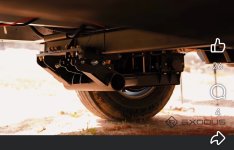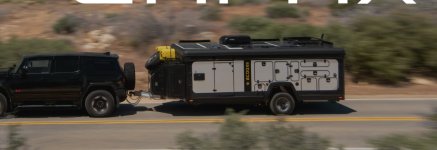That swing away tongue looks pretty beefy. If it has a weak point it is in the pullout pins. That is a highly stressed point and will likely get wallowed out over time from the heavy stress and play in the system. Bolts would be better, but slower to remove. It seems like an unfortunate compromise just to shorten the trailer by a couple of feet. These days, the code for a garage is, I think 19' depth. Barely enough, and many builders build to the minimum spec. Some trucks are longer than that.
I made a mistake on the "six bolt" wheels comment. They are actually 8 bolt. Good. I can't see the swingarms, but I noticed how far forward the shocks are mounted. They have very little advantage, or leverage over the suspension movement, at that location. It looks like the frame is a riveted setup, similar to the Pause and Reboot frames.
Those stabilizers are the same units used as the main tongue jack on the Reboot trailers. They are pretty strong and can be deployed electrically from the control panel. Good, but lots of expense and electrical equipment. With off-grid trailers we have an energy budget. How much power is to be budgeted for lowering the stabilizers at each stop? and why is that better than doing it with a hand crank or battery drill? I don't even use the stabilizers usually, and with more and more automation, comes more and more expense and repairs. I just don't feel the need for the trailer to do everything for me, or pay the price for that complication. It's getting to where trailers are simply luxury apartments on wheels, and any time we can detect a slight issue requiring us to get involved, we demand an upgrade. My Reboot is pretty complicated too, and I am always aware of how that could affect the quality of the trip if things don't work right.
Examples of this are that my water heater cracked and Truma won't sell parts to the end users. The Truma furnace is finicky about elevation and delivery air flow, resulting in shutdowns if everything isn't perfect. One of my stabilizers bent slightly and locked up. The only way I could get it out of the way was to unbolt is from the trailer. If I didn't have tools, it would have been more serious. The TV works with the Reboot onboard hotspot and is so complicated I could not figure out how to get the weather from local programming. The Victron solar controller must be programmed to work with the inverter and other controllers in the system. It is a proprietary program and uses a proprietary plug connection. Only dealers have access and then they can only borrow the equipment to do it. I cannot change out a simple solar controller and expect it to work with the system. There is a relay on the back of the electronics skid, where the controllers and inverter are mounted. These relays can go out and the only way to get to them is disassemble the seat and remove the entire skid while dealing with all the wiring that is crammed in around it. Then everything in the trailer is shut down until that little relay gets fixed. It could have just as easily been mounted on top where it could be reached with no problem. The air suspension works very well, but don't ry to fix a leak or replace a control valve, because all that stuff is above the underbelly aluminum bottom that protects it all from splash and weather. That bottom is siliconed and bolted on. And it appears to be one piece under the entire bottom of the trailer. Very difficult access to the equipment.
Simplicity and serviceability are very important. Trailers require maintenance and they have failures. Wanting more and more complicated systems and automation does and will lead to disappointment. We each need to decide what "camping" means. For me it is freedom, travel, exploration, seeing new things and puttering around on the trailer to dial it in. Campfire time with friends, interacting with the wild burros and horses, photography and learning about the geology of the West. But it is not about getting help to watch TV, or to make the solar work, from professionals. It is not getting stranded with poor equipment or driving a thousand miles home with no air suspension. That is why I like simple mechanical systems that are well proven. The Reboot, for instance is the most complicated trailer I've ever had. It is a wonderful thing, but I always have my fingers crossed that I don't have to fix the suspension or the charging system. I'm at a point where I am not enamored with over the top high tech, or luxurious camping equipment. We need a good towing trailer, well insulated, with good suspension. A good water system, heating system, shower and toilet system. A good solar system and lithium battery bank. I want a large compressor fridge and a propane stove. An outside griddle is a big plus. A few chairs, a fire pit and I'm happy. These allow us to go out and stay out, off grid. Bring on the adverse weather as that's fun. We'll camp eight miles from home or on the other side of the Country.
End of rant.



